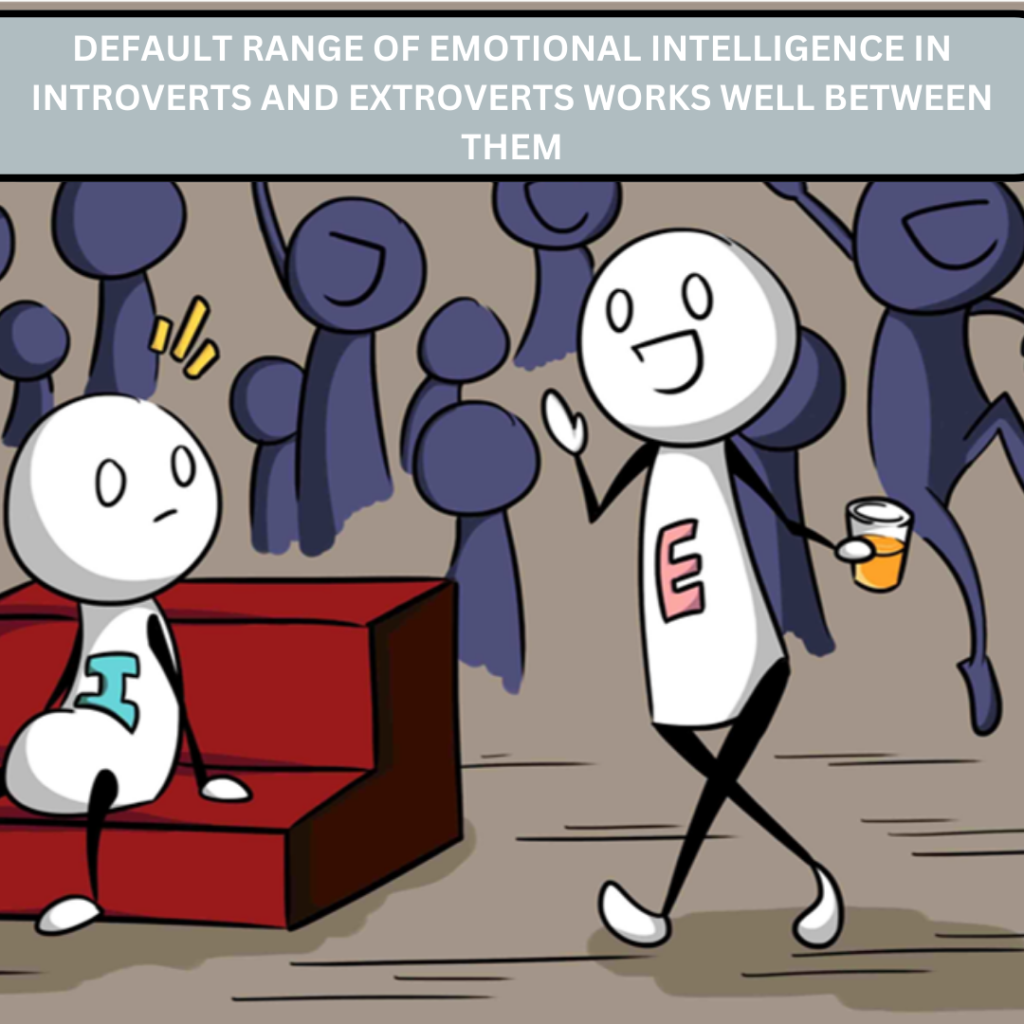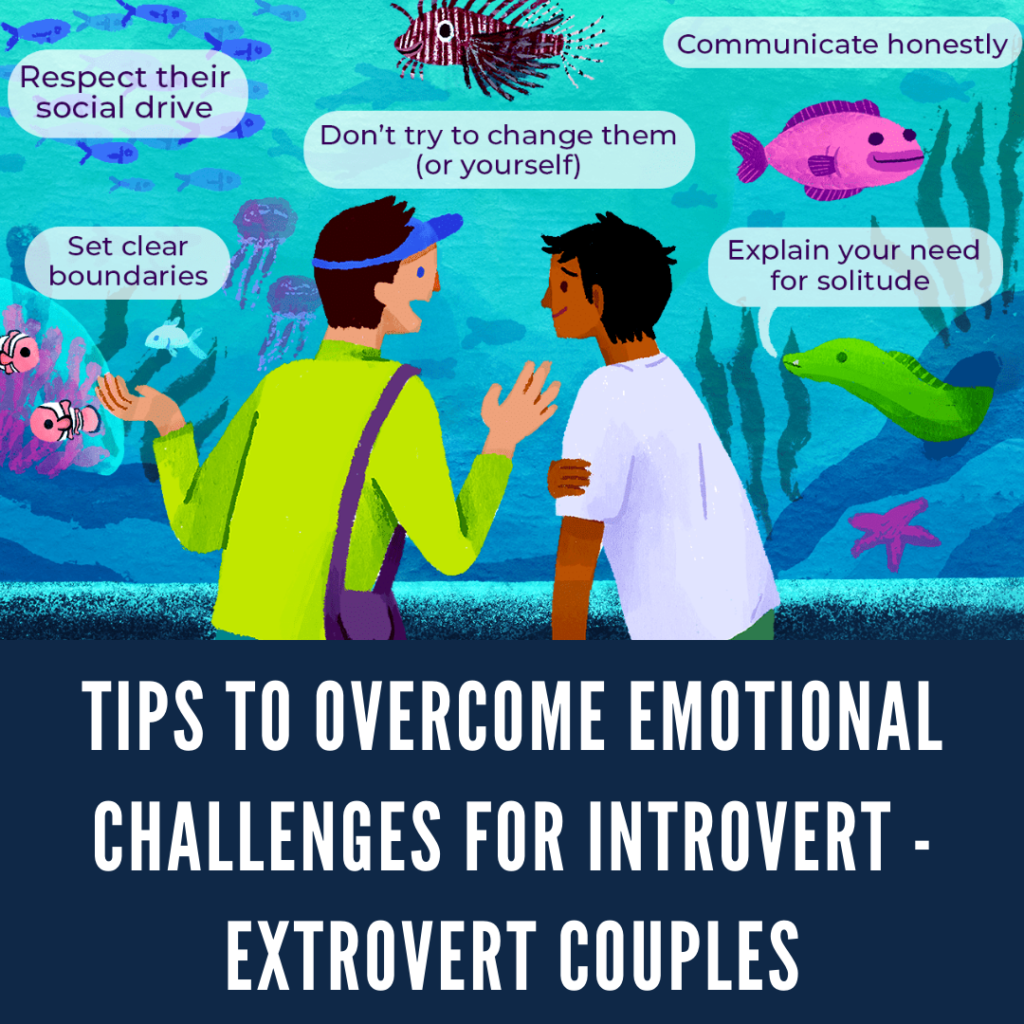“In relationships, emotional intelligence is the secret ingredient to lasting love.”
– Travis Bradberry
Love is a symphony, and within it, introverts and extroverts bring their unique emotional intelligence, enriching the melody of connection. In this exploration, we delve into the profound dynamics of introvert-extrovert relationships, guided by the soulful essence of emotional intelligence.
Understanding Emotional Intelligence in Introvert-Extrovert Couples:
• The Social Symphony:
◦ Introverts:
Finding depth amidst the noise, introverts shine with insightful observations and meaningful conversations.
◦ Extroverts:
Infusing energy into social gatherings, extroverts read cues adeptly, ensuring everyone feels valued.
◦ Resolving Discord with Harmony:
Imagine a crowded party where both partners start to feel uneasy. The introverted partner may subtly signal to their extroverted counterpart that they need a break from the noise and crowds. Sensing their partner’s discomfort, the extroverted partner readily agrees and suggests stepping outside for some fresh air, providing a brief respite from the chaos. In this scenario, both partners demonstrate emotional intelligence by recognizing and responding to each other’s needs without hesitation.

• Conflict Resolution:
• Introverts:
During conflicts, introverts demonstrate emotional intelligence by carefully considering their words and emotions before expressing themselves. They prioritize active listening and seek to understand their partner’s perspective, fostering empathy and mutual respect.
• Extroverts:
Extroverts approach conflict with emotional intelligence by openly addressing issues and expressing their feelings with honesty and transparency. They may initiate discussions to resolve conflicts proactively, creating a safe space for open communication and problem-solving.
• Quality Time Together:
• Introverts:
For introverts, quality time often involves quiet, intimate moments of connection. They demonstrate emotional intelligence by creating environments where they can bond with their partner on a deeper level, whether through meaningful conversations or shared activities that align with their interests.
• Extroverts:
Extroverts infuse quality time with energy and enthusiasm, seeking out new experiences and adventures to share with their partner. Their emotional intelligence is evident as they prioritize making their loved one feel cherished and appreciated, fostering a sense of excitement and joy in the relationship.
• Comfort During Quality Times:
During moments of stress or uncertainty, both introverts and extroverts offer support and comfort to each other. These couples enjoy quality time during challenging times as well. The extroverted partner may provide reassurance and encouragement, reminding their introverted counterpart of their strengths and capabilities. Meanwhile, the introverted partner offers a calming presence and listens attentively, providing a sense of stability and reassurance during challenging times. Together, they navigate obstacles with grace and resilience, showcasing their emotional intelligence in supporting each other through life’s ups and downs.
Tips For Navigating Challenges with Emotional Intelligence:
• Miscommunication During Conflict:
▪ Wrong Emotional Intelligence:
An extroverted partner, in the heat of an argument, becomes overly emotional and raises their voice, overwhelming their introverted partner. The introverted partner, feeling attacked and unable to process their emotions, withdraws further, exacerbating the conflict.
▪ Practical Strategy:
Take a time-out when emotions run high. Agree to pause the conversation and revisit it once both partners have had time to cool off. During the break, engage in self-soothing activities such as deep breathing or going for a walk to regain composure. When you reconvene, practice active listening and express your feelings calmly and respectfully.

• Emotional Disconnection During Quality Time:
▪ Wrong Emotional Intelligence:
The extroverted partner plans an elaborate date night filled with social activities and excitement, expecting their introverted partner to enjoy the experience. However, the introverted partner feels overwhelmed and disconnected, unable to fully engage in the festivities.
▪ Practical Strategy:
Prioritize quality over quantity in shared activities. Instead of focusing solely on external stimulation, incorporate opportunities for meaningful connection and intimacy that cater to both partners’ needs. Plan a cozy night in with a movie marathon or a board game session, allowing for relaxed conversation and genuine bonding without external pressures.
• Ignoring Emotional Signals:
• Wrong Emotional Intelligence:
The introverted partner, feeling emotionally drained after a long day at work, expresses a need for solitude and quiet time. However, the extroverted partner, eager for companionship and conversation, ignores their partner’s signals and continues to engage them in social interaction.
• Practical Strategy:
Respect each other’s emotional boundaries and signals. Create a communication plan where both partners can openly express their needs and preferences without fear of judgment or guilt. Practice active listening and empathy, acknowledging and honouring each other’s emotional states with compassion and understanding.
Conclusion:
In the intricate dance of love, introverts and extroverts complement each other with their unique emotional intelligence. Through thoughtful observation, empathetic listening, and respectful communication, Emotional Intelligence Trainings they navigate conflicts and nurture deep connections. By embracing their differences and playing to their strengths, introvert-extrovert couples create a harmonious partnership that celebrates their journey together. Emotional Intelligence Training helps them in excelling good relationships.





Leave a Reply